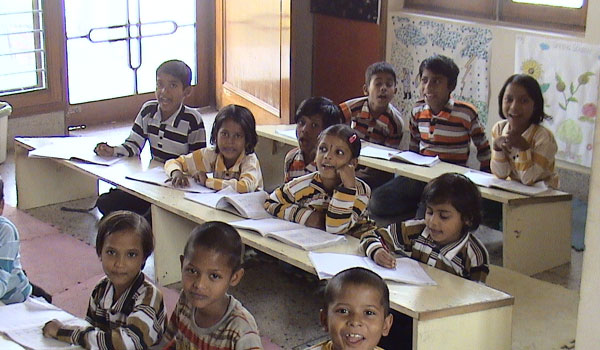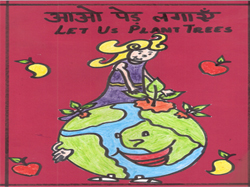
Our Educational Programs
Education programme: Our Direct programmes comprise of focussed interventions, where our team plans, conducts and phases the programs .The area under approach is Greater Noida.
The programmes are typically conducted within the space of our foundation where we have set up learning centres .The foundation is located in the vicinity of construction sites. The children come from extremely low income backgrounds and do not have any access to any schooling facility.
Our staff is mobilised and teacher training is facilitated and the regular progress of the programme is monitored.
At the beginning of every academic year, we undertake a survey of local construction sites and some basic questions are asked.
1. Does the child have preschool school experience?
2. Does the child go to school?
3. Does the child know reading, writing and arithmetic?
4. Do the children have access to books and study material?
The parents of these children at each construction site are counselled to send their to our study centre. The aim is to increase the enrolment and learning levels of these children. We aim to build social, emotional, motor, cognitive skills of the preschoolers and to prepare the children to adjust to school environment .These programmes also help tackle the problems of retention and achievement at a nascent stage since most of the parents are illiterate and totally unable to help children in early childhood education.
If the children attend preschool, then there is a significantly higher chance that they will continue into Primary schools and will have a better set of school readiness skills.
Our flagship programme helps to improve reading, writing and basic arithmetic skills of children in the age group of 3 to 14 years.
By the end of our intervention we aim to target our children depending on each level to know basic alphabets ,numbers , colours , shapes , textures , read simple words , do simple sums , read simple texts and solve arithmetic problems. Our subjects include – Language Development (English & Hindi), Mathematics, Environmental sciences , Life Skills, Montessori Practical’s in Sensorial – Practical Life - Phonetics - Language Building - Numeric- Botany - Zoology & Geography, Art & Craft, Leisure & Play-way activities.
The programs conducted under direct intervention approach include
1. Preschool education
2. Learning support programs of functional literacy
3. Mainstreaming out of school children.
We have set up a learning preschool centre for children in the age group of 3 to 6 years and functional literacy classes for the children above 7 years of age .We provide full academic year learning support focussing on school framework curriculum and backed up by Montessori curriculum which supports hands on learning approach. Our target for this year {2019-20} is to further support and positively impact the lives of 300 children . Our education programmes are divided into 4 levels – Pre-Nursery, Nursery, KG & Functional Literacy.
The schooling experience comprises of classes being conducted for 4 hours daily with a planned daily, weekly and monthly curriculum; from 0900hrs to 1400hrs, 5 days a week. We do not shut for summer vacations to prevent children getting out of the habit of attending school.
Approx 20 to 25 children gather in each class everyday and learn to engage with numbers, shapes, colours ,art work stories , poems and songs .Our teachers and assistants are trained in early childhood care and education and classroom progress is monitored on a regular basis. Their qualifications include PG Diploma holders in Montessori Training, BA (Hons) NTT & PTT. Our classrooms assistants are all senior secondary level or equivalent. Additionally, we have a support staff for security/caretaker and housekeeping. All staff is on our rolls and are paid a monthly salary.
We aim to build and strengthen the reading, writing and arithmetic skills of children. .Children who are unable to undertake age and grade specific reading, writing and arithmetic are helped to build their language and numeric skills and aided to read simple texts.
Children are assessed on their reading and arithmetic levels and grouped on to the basis of levels of knowledge.
All activities are built from that level onwards .Once the level each child is determined, and then techniques are used with each child to help improve his /her skill sets.
Results are evaluated before and after the interventions and the Montessori methodology further aides in increasing the learning levels of children quickly..
Once basic reading skills are built, they are taught how to read with comprehension and express what they have learnt.
We have conceptualized an awareness education programme in a child-centric environment using extensive learning material to educate, train, stimulate and encourage young children in to learning by Montessori curriculum which encourages learning by doing in a child friendly and age appropriate manner. Play-way and Art therapy are a big feature of our programmes. Stress on functional literacy and providing non formal pre primary education is our objective. We aim to inspire, sensitize, motivate and educate young children with an education programme using a hands-on learning approach. Practical exercises and activities would enable children to learn and imbibe comprehensively. Special teaching aids shall be used to make learning easy along with traditional concepts like story book reading, song sessions and art n craftwork. We provide colourful and interactive books. Fun filled activities, drawing, skill building, recreation workshops additionally enhance confidence.
The objective is to make learning fun, encourage creative expression, build and sustain children’s interest in learning.
Learning material books, note books, supplies, stationery kit, art & craft material are provided free of cost to all our underprivileged children in proper set up classrooms equipped with all essential training aids and furniture.
To further elaborate on the matter above, the funds are used for (but not limited to):
1. Educational aids { Montessori and regular teaching aids}.
2. Text books, picture books , notebooks, drawing books
3. Stationery materials and art craft kits
4. CDs, display boards, black boards and visual teaching aids.
5. Other relevant educational material.
6. Curriculum development.
Education Program |
Nutritional Program |

|

|
| |
|
Health - Care Program |
Plantation Drive |

|

|
|